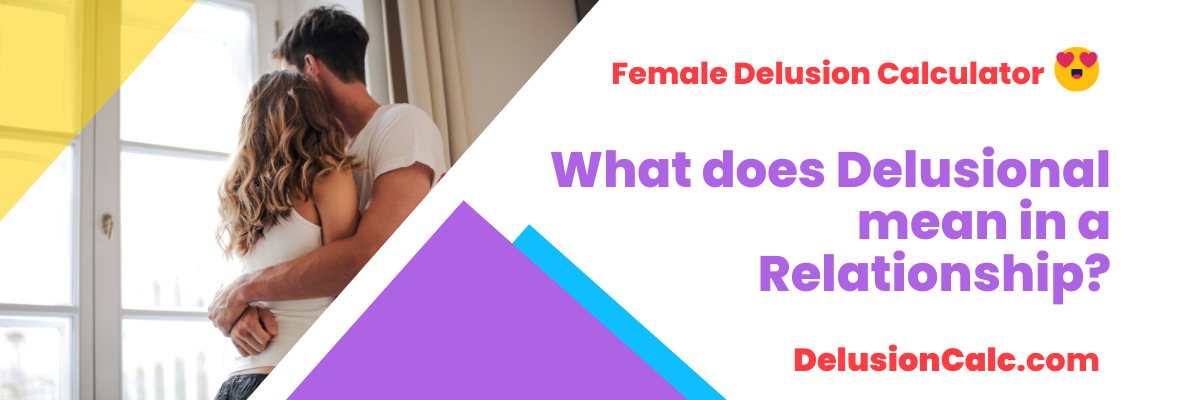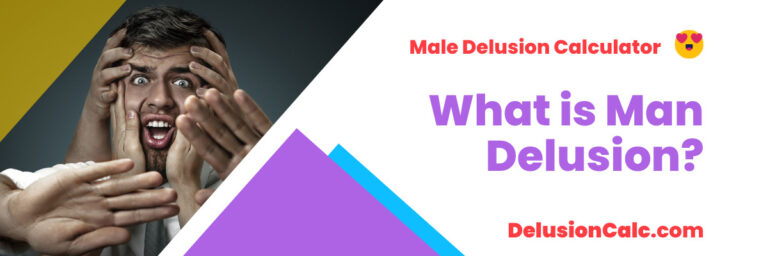What does Delusional mean in a Relationship?
We will talk about What does Delusional mean in a Relationship and what are its types, and much more about it.
In a relationship, being delusional means having beliefs or expectations that are far from reality. It’s like imagining things about your partner or your relationship that aren’t true. This can lead to misunderstandings and problems because you’re not seeing the relationship as it really is.
Understanding Delusional Disorders in Relationships
It’s crucial to dissect the term to its core. Delusions are rigid, false beliefs that an individual holds despite contrasting evidence.
These delusional beliefs often lead to an altered perception of reality, significantly affecting interpersonal relationships, especially romantic ones.
Delusional Beliefs
At the crux of delusional disorders are delusional beliefs. These are staunch, false beliefs based on incorrect interpretations of reality, even when substantial evidence proves otherwise.
Erotomania
Erotomania is a form of delusional disorder that stands out in the realm of relationships. Individuals with Erotomania harbour the delusional belief that another person, often of higher social status or unattainable, is in love with them.
This delusion can lead to stalking and other high-risk behaviours, making it a notable concern in romantic relationships.
Delusional Jealousy
On the flip side, Delusional Jealousy is another manifestation of delusional disorders in relationships.
The jealousy stems from a delusional belief, often without any factual basis, causing significant distress and potential harm to the relationship.
Impact on Relationships
The presence of delusional disorders can result in a myriad of problems within relationships. From trust issues to emotional distress, the repercussions are vast and often require professional intervention.
Read about female delusion disorders
The interplay between delusional disorders and relationships is a profound one. It goes beyond mere misunderstandings, diving into a realm where reality is skewed through a distorted lens of delusion.
As we navigate the intricacies of delusional disorders like Erotomania and Delusional Jealousy, the need for awareness, understanding, and professional help becomes clear.
This foundation sets the stage for a deeper exploration into the types, causes, and management of delusional disorders in relationships, ensuring a well-rounded comprehension of this psychological difficulty.
Delving Deeper into Delusional Disorders
Grasping the Essence of Delusions
The nature of delusional disorders often leaves many perplexed. Now, let’s explore the nature and types of delusions that may plague individuals. They often seep into their romantic relationships, causing a chasm of misunderstanding and mistrust.
Fixed False Beliefs
Recognizing that they stem from fixed false beliefs is central to understanding delusional disorders. Despite evidence to the contrary, these beliefs remain unshaken, creating a skewed perception of reality that engulfs the individual’s thoughts and actions.
Variety of Delusions
Delusions aren’t monolithic; they come in various forms with unique characteristics and implications. Some common types include:
- Paranoid Delusions: Where individuals believe they’re being conspired against or harmed by others.
- Grandiose Delusions: Where an inflated sense of worth or identity is held.
- Erotomanic Delusions: The belief of being loved, often by someone unattainable or of higher status.
5 amazing facts about Delusional Thinking in Relationships
- Widespread Issue: Studies show that a significant number of people experience some form of delusional thinking in relationships, impacting their emotional and relational health.
- Technology Influence: With the rise of social media and online platforms, delusions about ‘perfect relationships’ have increased, as people often compare their relationships to idealized versions seen online.
- Psychological Impact: Delusional thinking in relationships can lead to serious mental health issues like anxiety and depression if left unchecked.
- Gender Perspectives: Research in 2024 indicates that men and women may experience and express delusional thoughts differently in relationships, often influenced by societal norms and expectations.
- Help and Solutions: There’s a growing trend in therapeutic and technological solutions, like apps and online tools, designed to help individuals identify and overcome delusional thoughts in their relationships.
Delusional Disorders: A Closer Look to What does Delusional mean in a Relationship?
Delusional disorders are psychiatric conditions characterized by the presence of persistent delusions.
These disorders are not merely whimsical fantasies but deeply entrenched beliefs that affect the quality of life and relationships of those afflicted.
Diagnostic Criteria
For a condition to be diagnosed as delusional, the delusions must persist for at least one month. They cannot be attributed to other psychiatric conditions such as schizophrenia or mood disorders.
The diagnostic process involves a thorough psychiatric evaluation to ascertain the presence and extent of delusional thinking.
Impact on Relationships
The manifestation of delusional disorders in relationships can be debilitating. It fosters a breeding ground for mistrust anxiety and often leads to the deterioration of meaningful connections.
The individual’s delusional framework alters the essence of the relationship, turning love, trust, and understanding into foreign concepts shrouded in doubt and fear. Try out this male delusion calculator for anxiety.
Prevalence
Although exact figures on the prevalence of delusional disorders are scarce, what’s clear is that these disorders pose a significant challenge, especially in romantic relationships where emotions run high and the stakes are personal and profound.
Navigating the labyrinth of delusional disorders requires a blend of awareness, understanding, and professional guidance.
As we venture further into Erotomania and Delusional Jealousy, these disorders’ toll on relationships becomes glaringly apparent, underscoring the need for effective management and therapeutic intervention.

A Delusional Pursuit of Love
Unfamiliar to many, Erotomania emerges as a poignant illustration of how delusional disorders intertwine with the realm of love and relationships.
This rare but impactful disorder often lurks in the shadows of unrequited love, morphing reality into a narrative of fanciful romance and unwavering affection.
Must Read: does a delusional person know they are delusional?
The Fabric of Erotomania
At its core, Erotomania is a delusional disorder where an individual fervently believes that another person, often of higher social standing or seemingly unattainable, is in love with them.
This delusional belief is not fleeting; it’s robust and persists despite clear evidence to the contrary.
- Origin of Belief: The origins of this delusional belief can be complex and multifaceted, often rooted in a combination of psychological, social, and perhaps neurological factors.
- Unwavering Conviction: The hallmark of Erotomania is the unwavering conviction with which the individual holds the delusional belief. Any attempt to dispute or debunk this belief is often brushed aside, with the person clinging to far-fetched evidence to support their delusional narrative.
Historical Traces and Modern Understanding
Erotomania is not a modern-day concoction; references to this peculiar form of delusional love trace back to ancient times, showcasing the enduring nature of this psychological phenomenon.
Historical References
Notable figures like Hippocrates, Plutarch, and Galen have mentioned conditions resembling Erotomania in their works. The term “old maid’s insanity” was once used to describe what is now known as Erotomania or de Clerambault’s syndrome.
Modern Day Interpretation
Today, Erotomania is recognized as a serious mental health condition with profound implications on the individual’s life and relationships.
The Impact of Erotomania on Relationships
Erotomania doesn’t just reside in the individual’s mind; its ripple effects extend far into relationships, sometimes with devastating consequences.
- Disruptive Behaviors: Individuals with Erotomania might engage in disruptive or even criminal activities like stalking, persistent telephoning, or harassment as they seek to nurture the delusional love they believe exists.
- Risk of Violence: In extreme cases, Erotomania can escalate to violent behaviours, underscoring the gravity of this delusional disorder and its potential for harm.
- Emotional Toll: The emotional toll on the individual with Erotomania and the object of their delusion can be overwhelming, often leading to distress, anxiety, and a deterioration of personal and professional relationships.
Unravelling the enigma of Erotomania provides a window into the profound impact delusional disorders can have on relationships.
It underscores the necessity for awareness, understanding, and professional intervention to mitigate the adverse effects and foster healthier interpersonal connections.
Through this lens, we can further explore other manifestations of delusional disorders in relationships, each with unique challenges and implications.
Frequently Asked Questions
What does it mean when someone is delusional about you?
If someone is delusional about you, they have a false or distorted belief or perception about you that is not based on reality.
They may have unrealistic expectations, make unwarranted assumptions, or believe things about you that are demonstrably untrue.
What does it mean if a girl is delusional?
If a girl is delusional, she has false beliefs or perceptions inconsistent with reality.
In the context of a relationship, this might manifest as her believing she has a future with someone who has made it clear they are not interested or assuming traits or feelings in her partner that do not exist.
Is it bad to be delusional in a relationship?
Being delusional in a relationship is generally unhealthy. It can lead to poor decision-making, emotional distress, and a lack of genuine connection between partners.
Delusional thinking can be a barrier to resolving conflicts and can even be harmful or abusive in some cases.
How can you tell if someone is delusional?
Identifying delusional thinking can be challenging, especially in a relationship where emotions run high. However, some signs may include:
- Persistence in false beliefs despite clear evidence to the contrary
- Irrational behaviour or speech
- Emotional responses that seem out of proportion to the situation
- Refusal to consider other perspectives
- Difficulty in separating fantasy from reality
How do I stop being delusional in love?
Addressing delusional thinking often involves confronting your thoughts and beliefs.
Self-awareness and introspection are key, but professional help from a psychologist or psychiatrist is often necessary, especially if the delusions are severe or causing significant distress.
How do you know if your partner is delusional?
Your partner may be delusional if they:
- Stick to false beliefs about you or the relationship despite clear evidence or reasoning
- They seem disconnected from reality in how they view the relationship
- Show an unwillingness or inability to consider other points of view
- Respond to situations or discussions with disproportionate emotions
Recognizing delusional thinking in oneself or one’s partner is the first step toward seeking help and improving the relationship. Professional counselling or psychiatric care may be necessary in severe cases.







